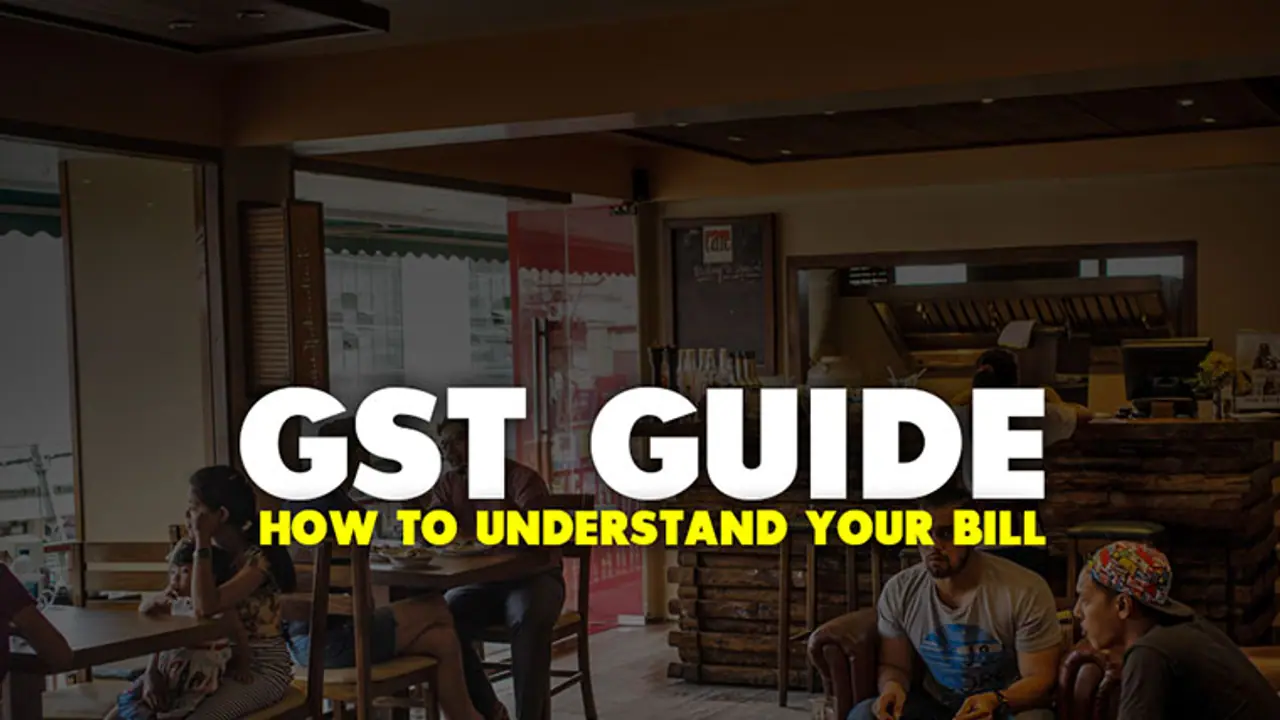Some restaurants have increased their menu prices, claiming that their cost have increased. With input tax credit benefit the prices should actually come down Your final bill under GST may be even lower than the total amount mentioned in the table Let us take a look at the bill you will pay in a restaurant and try to analyse if you are cheated by some in the name of GST
The Goods and Services Tax (GST), which came into force from July 1, continues to confuse people as they still try to figure out the actual charges under the tax and impact of it on the price of goods and services. Amid this confusion, there are many businesses including goods and service industry who are not passing the benefits of GST to the customers. Similarly, many businesses have increased their item rates despite several rounds of warning by the government.

Let us take a look at the bill you will pay in a restaurant and try to analyse if you are cheated by some in the name of GST.
Taxes charged by the restaurants

The pre-GST restaurant bill comprised components such as VAT, Service tax, Swachh Bharat Cess (SBC), Krishi Kalyan Cess (KKC) and Service Charges(charged by some restaurants). VAT was applicable on the food item consumed. Service tax was applicable on the services provided by the restaurant, and government had nothing to do with it. Let us understand a restaurant bill under pre-GST tax system with the example given below.
Restaurant Bill (Pre- GST) | |
Items | Amount |
Paneer Chilly | 180 |
Soup | 150 |
Nan | 120 |
Roti | 40 |
Mix Veg | 140 |
Paneer Butter | 180 |
Cold Drink | 40 |
Total | 850 |
Service charge @10% | 85 |
Service Tax @ 14% (5.6% after abatement) | 52.36 |
VAT* @14.5% | 123.25 |
Total Bill Amount | 1110.61 |
Note- VAT may Vary from state to state; SBC and KKC considered for easy understanding | |
Under GST, rates have been fixed as mentioned in the table give below:
GST Rate on Restaurants | |
Restaurant Type | GST Rate |
Under composition scheme | 5% |
Restaurant having no AC and no liquor served | 12% |
Restaurant with AC (partial or full) or serving liquor | 18% |
So, GST rates for restaurant varies between 5% (for composition scheme) to 18%. While the restaurant under the composition scheme won’t be eligible to get the input tax credit, rest GST slab will get this benefit. Let’s check out the change in your restaurant bill while considering the same menu which was discussed earlier as per VAT & service tax rule.
Restaurant Bill (Post- GST) | ||||||
Items | Under composition scheme | No AC & No Liquor Restaurant | Restaurant with AC or serving Liquor | |||
Tax Rate | Tax Rate | Tax Rate | ||||
Paneer Chilly | 180 | 180 | 180 | |||
Soup | 150 | 150 | 150 | |||
Nan | 120 | 120 | 120 | |||
Roti | 40 | 40 | 40 | |||
Mix Veg | 140 | 140 | 140 | |||
Paneer Butter | 180 | 180 | 180 | |||
Cold Drink | 40 | 40 | 40 | |||
Total | 850 | 850 | 850 | |||
Service charge @10% | 85 | 85 | 85 | |||
CGST | 2.50% | 21.83 | 6% | 54.37 | 9% | 84.07 |
SGST | 2.50% | 23.38 | 6% | 56.10 | 9% | 84.15 |
Total Bill Amount | 980.21 | 1045.47 | 1103.22 | |||
From this bill, it is clear now that customers will need to pay less amount in comparison to pre-GST bill. Under all GST rates, i.e. composition (@5%), 12% and 18% the restaurant bill will come down.
If you think this is the final amount you would need to pay, then wait! Your final bill under GST may be even lower than the total amount mentioned in the table. How? Let’s check out.
Under VAT & Service Tax system restaurants would take input tax credit only against VAT, but under GST it can be taken on the complete tax amount. Restaurants can take input tax credit on items such as edible oil, ghee, butter, sugar, etc and reduce the prices on the menu. This way the benefit of input tax is passed to the customers.
If you consume alcohol

As alcohol has been kept out of the GST list, therefore VAT would continue to be applicable on alcohol consumption (at the respective state’s tax rate). So, if you consume food and alcohol both at any restaurant, then that restaurant will charge you GST on the food item and VAT on the alcohol and you will get two separate bills for food and alcohol.
Some restaurants have increased their menu prices, claiming that their cost have increased. With input tax credit benefit the prices should actually come down. Confusions would allay soon going forward and restaurant owners would be able to figure out their new costing. With this the menu price is expected to get adjusted accordingly.
It is important for you to know that the maximum GST rate applicable on any restaurant is 18% and if any restaurant charges you more than this, then you can file a complaint with appropriate authority along with proof of overcharging.

(The writer is CEO, BankBazaar.com)
